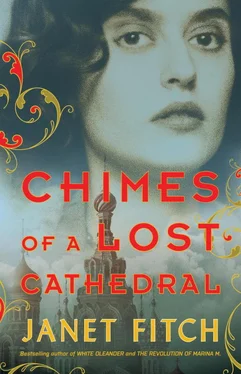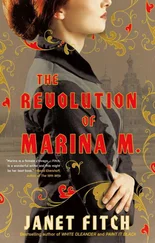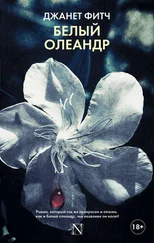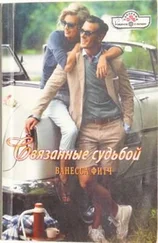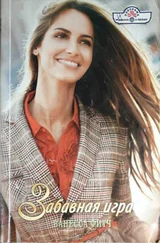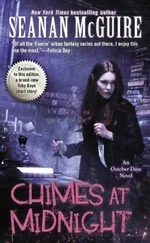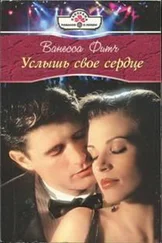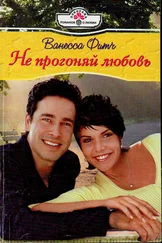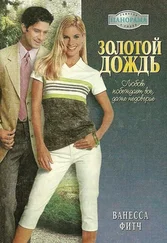“I was proud of you.”
He sighed. “But did you dream of me, Marina? Did you lie awake at night, groaning with thoughts of how you tormented me? I haven’t gone a day without thinking of you.” He crushed me to his breast, speaking fast in my ear. “I’ll love you forever, you know. No matter what. Kick me like a dog, I’ll come crawling back.”
I could see the sailor, his beret set back on his head, gazing up to heaven, as if praying God would come down and knock some sense into this poet.
“This is the girl,” Genya announced, “I’ve been waiting for all my life.” He struggled to stand in a sudden rush of passion. We grabbed on to him, men bracing his legs, another holding on to his belt as he sang out to the sun:
You! Redhead!
You
who laughed when the others
bolted like chickens
before the rumble of
my iron wheels
the roar of the furnace in my belly.
They scattered
Like horses
before the black diabolical breath
of my smokestacks.
“Urah!” the soldiers shouted, the ones who could hear and the ones who couldn’t.
You!
without a whip or chair
marched into my bearish den
Unarmed,
and clapped your little flower-hands
ordering me to
Dance, Bear!
Dance!
For you alone I dance
in my cloddish way
Baring my yellow teeth
roaring
my threadbare pelt
rich with fleas,
though I wanted to appear to you magnificent!
He threw his arms wide and the men struggled to keep their grip.
You clapped out a mazurka
a waltz
then stepped in for—
a
tango.
“You’re not afraid?”
The young girls trembled.
“You’re not appalled?”
The old maids hissed.
But I was the one
This bear in your arms
Who loved
and feared you the most.
Only Genya could love like this, only he had enough heart for it. We held him there as he rode the rushing train, a Colossus reciting into the wind, superhuman, forgetting everything but his love, his greatest madness.
Finally, he lowered himself back down to the roof, flushed with triumph. “Now tell me you didn’t dream of me.”
I held him close, printing his rough woven Russian blouse and its button into my cheek. “Yes, you and all of this.”
“This?” He pressed my hand to his chest, I could feel the bones, the muscles through his shirt. He grinned—his thick, strong brow, his big jaw. “It’s not a dream.” He shook Slava’s shoulder. “Or else we’re all dreaming it. The whole world is dreaming us now.”
We lay on the lower bunk of our compartment after the train had stopped for the night. I missed the wind, the swaying of the train. We slept with the window down, batting at mosquitos that longed for our blood, our naked bodies fragrant from making love. At first, he’d been afraid of hurting the baby, but the baby liked it just fine. “Let me guess. You and Apollonia.” The blond actress.
“Why not?” he said. “I didn’t know that I’d ever see you again. Did you save yourself for me?”
“Of course.” It made him laugh, that wonderful deep sound. His hand on my belly. “I assure you, the conception was immaculate. Your girlfriend’s taking it pretty well, I have to say. She’s only spilled hot tea on me three times.” Apollonia regularly bumped into me in the canteen or in the corridor, especially if I was carrying something hot. Well, I couldn’t blame her for it. I could deal with her false smiles far better than Zina Ostrovskaya’s sharp-toothed attacks in the days of the Transrational Interlocutors of the Terrestrial Now.
“She’ll be okay,” he said, reaching over me for a cup of tea on the floor, drinking, the liquid spilling down his chin. “You’re my wife. My very pregnant wife.” He tickled my belly with light fingers and the child writhed under his hand. Our child.
I snuggled back against him. Hot, but oh, such a pleasure. My body remembered him. Mine. “Whatever happened to Zina? Why isn’t she here? Did you finally kill her off?”
“You never liked her,” he said. “I couldn’t understand it. Too much alike, maybe.”
My turn to laugh. That jealous, spiteful little ferret? Was he even serious? “Idiot.” I tried his forearm with my teeth, it was salty and hard, like a gnarled tree root.
We could hear the actors in the next compartment, arguing about playing Sorin in The Seagull .
“Was it another woman who finally drove her off?”
He buried his nose in my neck. “Woman? Woman? How could I have replaced you with a single woman? I needed boatloads of women. Whole cities of them. Sometimes the flat looked like Nikolaevsky station.”
I wrapped his arms tighter around me. Finally, I was content. Though I still suffered from heartburn whenever I lay down, it was bliss to be here with a man who knew me, remembered me, loved me— my husband. To be together again, doing something purposeful, something exciting, with our future on the way in several dimensions. “How about Marfa Yermilova?” I teased him. “I sense something there.”
Our political commissar, with her drooping mouth and unimpressed eyes, her black cigarette holder. I stayed out of her way as much as I could. When I first came onto the train, she and Genya had argued. I heard them in the corridor. There’s no room here for fellow-travelers.
She’s not, she’s my wife. She’s reliable. I vouch for her.
But what if you have to choose? One day you may have to put the Red October into harm’s way. Which will you protect, the revolution or your pregnant wife?
I’m a Bolshevik. I know my duty, he responded. Don’t worry about me.
I hoped it would never come to a choice. In any case, the front was still far away, and we were here in each other’s arms in the half-light of a northern June midnight, growing together again, the baby dancing under his hand.
Jolting along in the hot afternoon in the train’s canteen car, the baby lay still, as he always did when something was going on. I could feel him in there, listening. He had finally dropped, lessening the pressure on my lungs but making me clumsy. I swayed like a sailor when I walked. I could no longer navigate the ladder to the roof of the train, the sailors wouldn’t help me anymore. They said Genya didn’t like it, and for once, I didn’t argue. I made myself useful, mostly by staying out of the way. Usually I ended up camped out in the canteen car where the journalists gathered to bang out their stories on typewriters or scribble their impressions in notebooks to be wired back to their respective newspapers. They came from Moscow and Petrograd, as far as Kiev and Warsaw. That day, the young reporter from Kiev was especially glum. He hunched over his typewriter, his head caged in his hands as if birds trapped inside his skull were trying to peck their way out.
The others ignored him, but I sat down next to him. “Matvei, you okay?”
He shook his head.
“It’s a pogrom,” said another journalist, Kostya, from Petrograd Pravda. “The Ukraine’s breaking out like smallpox.”
Pogrom. The random community violence against the Jews. And he was a Jew, Matvei Grossman. He must be worried about his family back home.
“Kiev’s a White shithole,” said Grigory something, a sharp-tongued man from Krasnaya Gazeta. He rolled a makhorka and lit it, preparing to fumigate us in the hot car. “What a sty.”
Matvei groaned, sighed. “It’s not just Kiev. It’s the whole Ukraine. Kiev, Kishinev, down to the smallest village. They’re throwing us to the wolves.” He drank from the battered metal cup at his elbow.
Читать дальше
